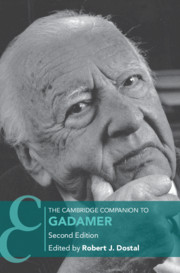Book contents
- The Cambridge Companion to Gadamer
- Other Volumes in the Series of Cambridge Companions
- The Cambridge Companion to Gadamer
- Copyright page
- Contents
- Contributors
- Abbreviations
- Introduction
- 1 Gadamer (1900–2002)
- 2 Gadamer’s Basic Understanding of Understanding
- 3 Getting It Right
- 4 Philosophical Hermeneutics, Language, and the Communicative Event
- 5 Phronesis and Solidarity
- 6 Gadamer’s Herderian Critics
- 7 Gadamer on the Human Sciences
- 8 Art Experience and Its Transformative Potential in Gadamer’s Hermeneutics
- 9 Lyric as Paradigm
- 10 Gadamer, the Hermeneutic Revolution, and Theology
- 11 Hermeneutics in Practice
- 12 Gadamer’s Hegel
- 13 Gadamer’s Relation to Heidegger and to Phenomenology
- 14 The Constellation of Hermeneutics, Critical Theory, and Deconstruction
- 15 Hermeneutics in a Broader Horizon
- Bibliography
- Index
- Other Volumes in the Series of Cambridge Companions (continued from page ii)
5 - Phronesis and Solidarity
Democratic Politics
Published online by Cambridge University Press: 29 July 2021
- The Cambridge Companion to Gadamer
- Other Volumes in the Series of Cambridge Companions
- The Cambridge Companion to Gadamer
- Copyright page
- Contents
- Contributors
- Abbreviations
- Introduction
- 1 Gadamer (1900–2002)
- 2 Gadamer’s Basic Understanding of Understanding
- 3 Getting It Right
- 4 Philosophical Hermeneutics, Language, and the Communicative Event
- 5 Phronesis and Solidarity
- 6 Gadamer’s Herderian Critics
- 7 Gadamer on the Human Sciences
- 8 Art Experience and Its Transformative Potential in Gadamer’s Hermeneutics
- 9 Lyric as Paradigm
- 10 Gadamer, the Hermeneutic Revolution, and Theology
- 11 Hermeneutics in Practice
- 12 Gadamer’s Hegel
- 13 Gadamer’s Relation to Heidegger and to Phenomenology
- 14 The Constellation of Hermeneutics, Critical Theory, and Deconstruction
- 15 Hermeneutics in a Broader Horizon
- Bibliography
- Index
- Other Volumes in the Series of Cambridge Companions (continued from page ii)
Summary
Gadamer saw hermeneutics as heir to the tradition of Aristotelian practical philosophy. The exercise of phronesis, good practical judgment, helps sustain the solidarities upon which democracy depends. Phronesis is distinguished from techne, technical knowledge. Gadamer is critical of technocratic thinking. Phronesis is closely related to ethos. It has communal dimensions such that it invigorates the ethos of the society and makes possible solidarity. The basis for this is friendship. Friendship involves a life together of reciprocal co-perception.
- Type
- Chapter
- Information
- The Cambridge Companion to Gadamer , pp. 117 - 138Publisher: Cambridge University PressPrint publication year: 2021
- 1
- Cited by

